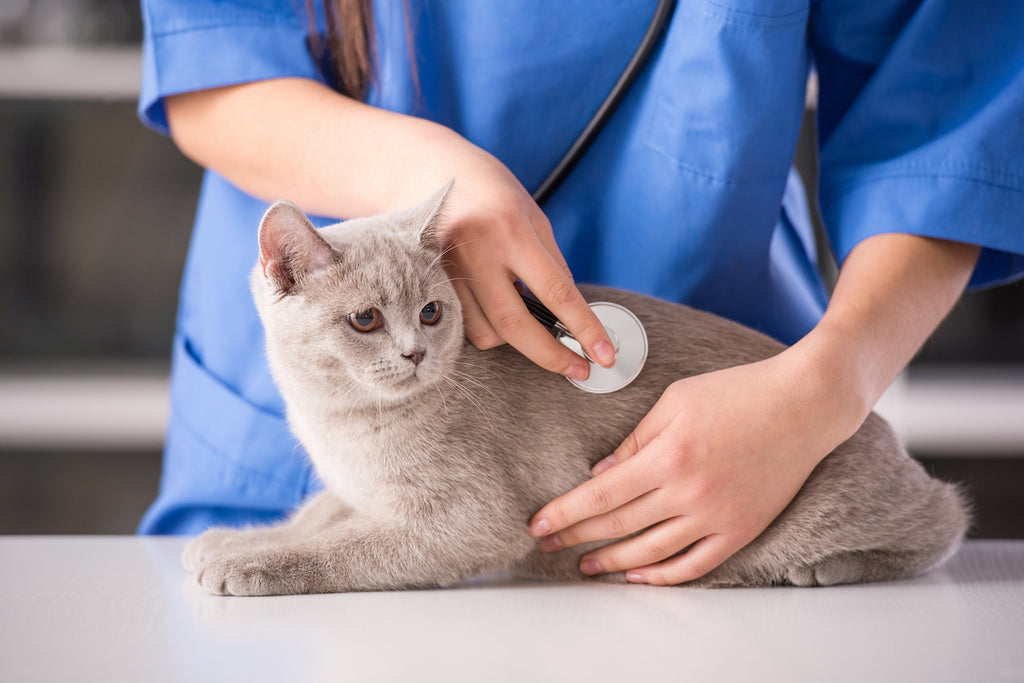10 Min Read
How Often Do You Take A Cat To The Vet?
Key takeaway

Why pet owners are switching to online vet care with Dutch
-
Prescriptions delivered free to you
-
Fast access to Licensed Vets over video
-
Unlimited video visits and follow-ups
Cats are fairly self-sufficient; you can leave them home alone longer than you can leave a dog, and many enjoy spending time alone. However, that doesn't mean they don't rely on their pet parents for their overall health and wellness. Taking your cat to the vet is an important part of being a pet parent, but how often should you take your cat to the vet?
Most experts agree you should take your cat to the vet at least once or twice per year, but this general rule of thumb isn't true for every cat. Unfortunately, many pet parents don't know how often their cats should get checkups or follow-ups based on their age and health. This article will discuss everything you need to know about taking your cat to the vet, including why it's important, how often your cat should go to the vet based on their life stage, and what happens during routine vet visits.
- The Importance Of Veterinary Care For Cats
- Kittens
- Adult Cats
- Senior Cats
- What Do Vets Check During A Physical Examination?
- Other Steps In The Routine Health Care Of Cats
- How Often Do You Take A Cat To The Vet?: FAQs
- Final Notes
The Importance Of Veterinary Care For Cats

Taking your cat to the vet for an annual or bi-annual wellness exam is important to ensure they can live a long, happy life. These exams can help catch health problems before they cause serious symptoms and can help your cat live longer.1 Annual wellness exams aim to detect illness early and intervene as soon as possible to prevent a disease from progressing while ensuring pet parents have the opportunity to discuss concerns directly with the vet.1
Since cats are good at hiding their pain and discomfort, it can be difficult for pet parents to know when their cats are ill. Of course, there may be some behavioral changes or physical signs of disease, but regularly scheduled checkups can catch issues pet parents can't at home because vets know what to look for. Ultimately, wellness exams are preventative care to prevent your cat from developing a disease or having progressing symptoms of a disease. For example, you may or may not notice worms in cat poop, but a vet's fecal exam can determine whether your cat has worms to help find the best treatment. Preventative care can help you save money down the line because it can prevent various diseases from progressing, but the most important thing it does is prevent your cat from becoming ill when possible.
Kittens
Kittens must visit the vet more often because they have developing immune systems and are susceptible to various illnesses. They typically go to the vet every three to four weeks until they're four months old.2 One of the most important parts of these vet visits is the vaccinations. Kittens are vaccinated at around six to eight weeks and receive boosters every few weeks until they're fully protected. The core vaccines for kittens recommended by the American Association of Feline Practitioners (AAFP) include the following:
- Feline panleukopenia (FPL)
- Feline viral rhinotracheitis (FVR)
- Feline calicivirus disease
- Rabies
At each vet visit, kittens will receive a complete physical examination and stool check to look for parasites. They may also have FeLV and FIV blood testing and deworming. During this visit you can also talk to your veterinarian about when to spay or neuter your kitten as timing depends on the individual.
Adult Cats
Once a cat reaches adulthood, they'll start going to the vet less often. Instead of going a couple of times a year like they did in kittenhood, they may only go once or twice a year, depending on their health.2 During their annual wellness exams, your pet may recommend a specific program based on their health. For example, they may want to monitor for early kidney or liver disease.2
Additionally, each wellness exam will consist of a physical exam, stool sample check, booster shots for various vaccinations, weight check, review of preventative care options, and a discussion of any symptoms your pet may be exhibiting.
Vets will also look in your cat's mouth as an oral health check to look for signs of oral disease. While you may not brush your cat's teeth every day because you think you don't have to, cats can get various illnesses due to dental disease. Therefore, your vet will look at your cat's teeth to determine whether they need professional cleaning. Additionally, many vets will do routine blood work to detect early disease. Blood work is especially important if your cat is on any medication.
Senior Cats

Senior cats should visit the vet more often than healthy adult cats. As your cat reaches their golden years, your vet will often recommend at least two yearly checkups.2 Disease is more common in older pets. Since their immune systems no longer work as efficiently as they did in their younger adult years, it's important to identify and provide treatment as fast as possible. Therefore, if your cat is eight years old or older, you should talk to your vet about whether or not to schedule more checkup exams throughout the year.
During the vet visit for senior cats, your vet will conduct the same testing as they normally do, including a physical exam. However, they'll also perform a yearly blood count, chemistry, and thyroid blood work to detect diseases early. In addition, your cat will have a yearly urine and fecal test while continuing vaccinations. Vets will also check your senior cat's oral health.
What Do Vets Check During A Physical Examination?
When you take your cat to the vet, you might be curious to understand the process, including what vets are checking for and the tests they perform. During the examination, your vet will conduct routine testing and touch your cat in several places while checking their ears, eyes, and mouth for signs of disease.
Of course, if you have any concerns about your cat's health, the vet will start with the symptoms. For example, if your cat is lifting their paw or limping while walking, your vet will examine their paw. Other areas pets examine include:
- Ears
- Eyes
- Skin
- Mouth
- Abdomen
Routine testing
Routine testing like blood work, urinalysis, and fecal examination are crucial to detecting underlying diseases that may affect your cat's overall health and wellness. Since it's difficult for pet parents to tell when their cats are sick or in pain, these tests can help catch disease early on and provide treatment before the cat starts experiencing unpleasant symptoms.
Vaccinations
Once the physical exam is over, your pet will receive any boosters or vaccinations they need to safeguard them against common potentially deadly diseases. Of course, your vet will discuss which types of vaccines your pet should have, but it's up to you to decide which ones are best for them.
Other Steps In The Routine Health Care Of Cats
While annual checkups are crucial for adult cats, pet parents must care for their cats' health at home to prevent disease and ensure their cats can live long, healthy lives. Other steps in the routine healthcare of cats include:
Grooming
Regular grooming is essential for cats because it can prevent painful tangles and hairballs from loose fur. In addition to regular brushing, you should trim your cat's nails regularly to prevent the nails from growing into the paw pads or getting snagged on the carpet. While many cats enjoy scratching posts, they may not be enough to keep your cat's nails as short as they need to be, so you should check your cat's nails regularly to determine the best time for trimming.
Cats should also have their ears regularly checked. Common ear problems in cats include external, middle, and inner ear infections that cause pain, discomfort, and itchiness. Luckily, ear infections are less common in cats than dogs, but they can be painful, so check in with your veterinarian if you notice any ear health concerns.
Dental Care
Between 50 and 90% of cats over the age of four have dental disease.3 Luckily, dental disease in cats is completely preventable with good oral hygiene practices. Since your cat can't brush their teeth themselves, you can take a cat toothbrush and brush away plaque for them. Of course, you may need to train your cat to accept tooth brushing at home, but it can prevent serious disease by reducing the development of plaque that can contribute to gum disease.3
Tick, Flea, and Parasite Control
Parasites can impact your cat's quality of life. Even indoor cats can get infested with common parasites like fleas, ticks, fecal parasites, and heartworms. External parasites like fleas, mites, and ticks require monthly preventative treatments. Flea and tick care is crucial to protecting your cat from potentially deadly diseases carried by parasites along with unpleasant symptoms like itchiness.4 Meanwhile, some internal parasites, like heartworms, can be prevented with heartworm prevention medication on a monthly basis. However, depending on the parasite, your vet might recommend a combination treatment of topical or oral medication every few months.

How Often Do You Take A Cat To The Vet?: FAQs
Do fully indoor cats need vaccinations?
Yes, indoor cats should have their vaccinations to protect them from contagious diseases. If your cat spends time in a public place, such as at a boarding facility or groomer's, they should have all of their core vaccinations. In addition, your cat is required to have some vaccinations by law. For example, all pets, including dogs and cats, must be vaccinated against rabies.
How often do cats need vaccines?
After a kitten has received all of their vaccinations, they'll get a booster every one to three years, depending on the type of vaccination. Some vets may have both options, while others require you to come back annually for booster shots.
How much does it cost to take a cat to the vet?
The cost of taking a cat to the vet depends on the reason for your cat's visit, the location of the vet, and the types of services you get. For example, an annual wellness exam can be a few hundred dollars at most vets' offices. However, since an annual exam can help you catch illnesses before they cause major health complications, they can save money by preventing diseases that may be expensive to treat.

Final Notes
When do you take a cat to the vet? It depends. Some cats only need to see their vet yearly for their physical exam. Still, you should feel welcome to take your cat to the vet whenever you feel it's necessary for their health and wellness. Accidents and injuries happen, so it's not uncommon for cats to visit the vet more than once a year, even if they're in good health. If you're wondering, "How often do you take a cat to the vet?" you should understand that it depends on your cat's age and health.
Luckily, you don't need to visit the vet's office for every minor illness. Dutch provides non-emergency vet care and advice to diagnose and treat your pet's ailments from the comfort of your own home, helping your cat avoid any stressful vet visits for routine illnesses and follow-ups that can be treated easily. Our vets can help you take better care of your pet by providing advice on everything from the best wet cat food to medications to prevent heartworm. Try Dutch today.Share
References
-
"Why Are Regular Veterinary Visits Important?" AAHA, https://www.aaha.org/your-pet/pet-owner-education/ask-aaha/why-are-regular-veterinary-visits-important/.
-
Bukowski, John A., and Susan Aiello. "Routine Health Care of Cats - Cat Owners." Merck Veterinary Manual, 10 Nov. 2022, https://www.merckvetmanual.com/cat-owners/routine-care-and-breeding-of-cats/routine-health-care-of-cats.
-
"Feline Dental Disease." Cornell University College of Veterinary Medicine, 3 May 2019, https://www.vet.cornell.edu/departments-centers-and-institutes/cornell-feline-health-center/health-information/feline-health-topics/feline-dental-disease.
-
Bukowski, John A., and Susan Aiello. "Routine Health Care of Cats - Cat Owners." Merck Veterinary Manual, 10 Nov. 2022, https://www.merckvetmanual.com/veterinary/cat-owners/routine-care-and-breeding-of-cats/routine-health-care-of-cats#v55078846.



